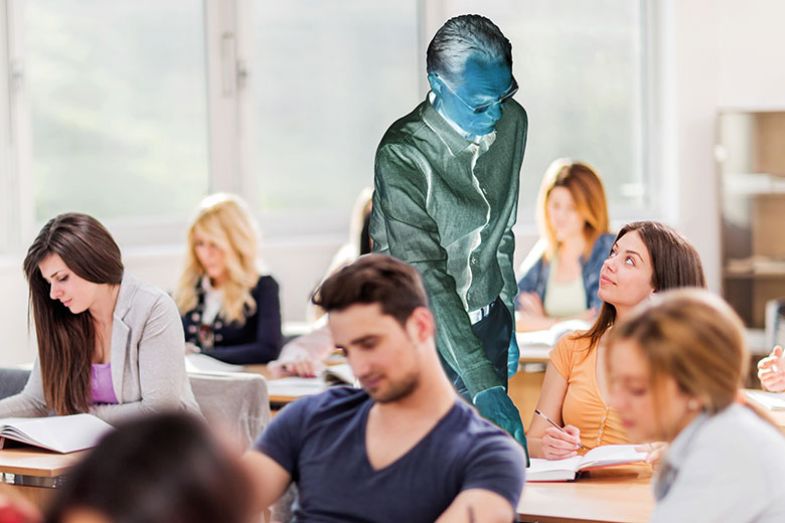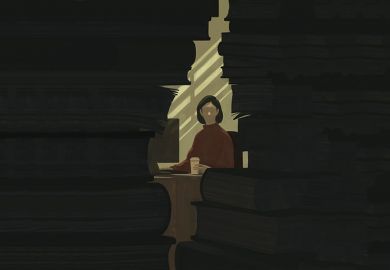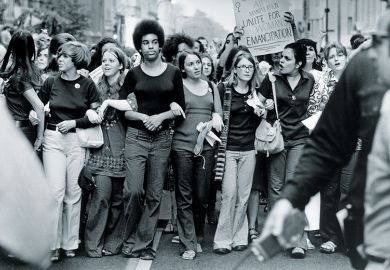More than six months after the Harvey Weinstein scandal catapulted sexual harassment to the top of the cultural agenda, academia is among the industries still grappling with the extent of the problem that it faces, and what to do about it.
The #TimesUpAcademia Twitter campaign launched last month by the Scotland-based journalist Vonny Leclerc elicited a considerable response. An open-source document created late last year by former US academic Karen Kelsky contains nearly 2,500 reports of sexual misconduct in mostly US and Canadian universities. And a survey by the UK’s National Union of Students, published in April, found that although most students objected to sexual approaches from academics, fewer than one in 10 reported it when it occurred.
In response to the NUS survey, campaign organisation the 1752 Group, which was closely involved in the survey, said that UK universities’ current disciplinary procedures are unfit for purpose, and it called on
them to “introduce professional boundaries that clearly define the expected relationship between a staff member and a student”, that “reflect the complexities of power and consent in the teaching relationship” and that punish transgressors.
Meanwhile, Australian universities are still scrambling to respond to last August’s report by the Australian Human Rights Commission, which found that one in 10 female university students has been sexually assaulted in the past two years, and that only 4 per cent of students believe that their universities are doing enough to support victims.
But, as well as raising questions about institutional processes, the #MeToo era poses dilemmas about the extent to which the past should now be reassessed, not merely in terms of behaviour but also curricula and reading lists.
Here, we present four perspectives on this broad issue. In one, an academic describes her slow-dawning realisation that her student relationship with her lecturer and, subsequently, PhD supervisor, was an abuse of power. In another, a former student finds her voice to speak out against the sexual harassment that she was subjected to by an academic after reading Sara Ahmed’s essay on sexual harassment. Another contribution reflects on whether the scholarship of those accused of sexual misconduct should still be taught. And a fourth reflects on how generations of literary scholars overlooked the sexually predatory behaviour of the “moral spokesman” of Steinbeck’s The Grapes of Wrath.
Towards the end of the novel, Steinbeck writes: “In the souls of the people the grapes of wrath are filling and growing heavy, growing heavy for the vintage.” He was not talking about sexual harassment, of course. But those words could easily apply to it.

I realised that my relationship with a lecturer was not romantic love but an abuse of power
I recently found out that the man who supervised my PhD, who I will call Elliot (not his real name), is engaged to one of his former undergraduates. This is, of course, not an exceptional occurrence in academia. But it did force me to rethink my own experience of sexual misconduct – or, as I had naively thought of it, romantic love. You see, Elliot’s fiancée is not the only former undergraduate he has had a romantic relationship with. There is at least one other: me.
Given the culture of denial, and even acceptance, around staff-student relationships, my confusion is not exactly surprising. Sexual advances by academics are frequently ignored, or, worse, covered up, by colleagues and students alike. Should a relationship eventually become established and go public, it is often accepted by the academic’s colleagues, especially if it ends in marriage. As an anonymous contributor to Times Higher Education recently put it: “Calling the [academic] out…is, at that point, perceived as an attack on a family man’s character, his wife’s judgement and their mutual, consensual love” (“Cultures of denial”, Features, 16 November).
I was, for a long time, part of this culture – convinced that academics such as Elliot were merely unlucky to fall in love with the “wrong” people. That is, until I was confronted with the truth about my own staff-student relationship: Elliot’s pursuit of me was part of a wider pattern of predatory behaviour that, on reflection, I now consider sexual misconduct.
I met Elliot when I took his second-year undergraduate unit. He was charming, confident and well-dressed. I remember squirming in my seat as he announced: “It’s hot in here, but I won’t take off my jacket, because I am a gentleman.” My friend told me to close my mouth – it had been hanging open as he spoke.
Elliot created a teaching atmosphere that I had not encountered before. Just as the previous THE piece put it, he “sexualise[d] the learning space to ‘prime’ the ego-satisfying possibility of being seen as sexual by [his] students”. He would often discuss former lovers in his seminars, and one of his lectures had to be rewritten when his sexually charged comments about women caused offence. Looking back, I now recognise that this behaviour was not unintentional, but rather part of a wider set of actions that allowed Elliot to seduce me.
His pursuit started small. I went to his office to borrow a book that he had mentioned in the lecture. Announcing that the room was too gloomy, he asked whether I’d like to go to Starbucks instead. I was taken aback at the informality, but it made me feel special to go somewhere more private. Elliot bought me coffee and we spoke at length about my life. He seemed to appreciate my intellect and ambition, which was an incredible feeling for a 19-year-old. Afterwards, I emailed to thank him for the book; in his reply, he brought up our “mutual appreciation for sushi” and suggested we go to dinner.
At the restaurant, Elliot ordered a bottle of sake. We clinked glasses, but he didn’t make eye contact. I told him that meant seven years of bad sex. I was immediately embarrassed, because this was something that I said to my friends. It struck me that it might not be appropriate to say to a lecturer, but Elliot’s reaction suggested otherwise. He looked into my eyes and said, “Is that just with the person you’re with?” Stunned and secretly pleased, I nervously laughed off the comment.
I began to regularly visit his office to “have tea”. We spent hours chatting about nothing in particular. I revelled in his attention. It felt like he understood who I really was and saw me as a kindred academic spirit. We exchanged emails every few days. He burned me CDs every week, handing them to me at the end of lectures. I still remember the lyrics from a particularly provocative song: “You turn me on and it’s hard to turn me on”.
A few weeks into term, he confessed his feelings for me at a wine tasting that he had arranged for his students. He got me alone and asked me if I was flirting with him. I felt embarrassed. I apologised profusely for being a stupid young girl with a silly crush. He interrupted me: “You are not stupid – this is not a one-way street.” I could not believe what I was hearing. He admitted to finding me attractive but added that if we were to “date”, we would have to keep it a secret.
My feelings at this point were very confusing and painful. When I thought about it objectively, it seemed preposterous that such an intelligent and mature man would be interested in a young student. And I definitely did not want to sneak around. So, after a few days of mulling things over with my friends (who found the situation funny and never questioned the problematic nature of his advances), I told him that my feelings for him were too difficult to manage and that we should stop speaking for a while. It was a tough conversation for me, but he seemed unaffected.
I largely managed to avoid Elliot for the rest of my undergraduate degree and my subsequent master’s. When I did see him, I tried to keep our interactions professional. I blamed myself for his previous behaviour, convincing myself that I had led him on.
Towards the end of my master’s degree, I began thinking about pursuing a PhD in the area that Elliot specialised in. By this point, I was sure that my “silly crush” had subsided and told myself that Elliot’s intellectual prowess and expertise would aid my development. So, I asked him for help with my PhD application and he happily obliged. To my relief, he did not broach the subject of our past.
A few months later, he invited me to a university event, which was followed by dinner and drinks. I got very drunk. On the way from one pub to another, I was cold, and Elliot told me to put my hand in his coat pocket, where he wrapped his hand around it. He whispered: “Come to my house. Imagine the night we could have. Let’s jump in a taxi: no one will see.” I agreed immediately – yet, despite the clear implications of his invitation, I was shocked when he kissed me in front of his fireplace.

I woke up in his bed. He confessed that he had been grateful that I had ended our “flirtations” during my undergraduate days because he “didn’t have the strength to”. He explained that I was the first student he had ever been “tempted by”. We began a relationship, undeterred when I was accepted shortly afterwards for a PhD programme, with him as my supervisor. I failed to question the power dynamics of our relationship because I believed that I was the only student he had ever pursued. This made our love seem “real” and unproblematic.
And yet, I knew something was not quite right. A therapist I went to see to discuss my relationship with Elliot was horrified that I was dating my prospective supervisor, but my main concern was that I was in a relationship with someone who couldn’t tell anyone about me – and who I couldn’t tell anyone about. Elliot had convinced me that if our relationship became public, people would lose respect for me as a scholar.
I realised that being someone’s “dirty little secret” was not good enough for me, and finally broke things off as my PhD programme began. But the effect on my self-esteem of Elliot’s warning remained. I was convinced that the only reason I was able to pursue a PhD was his rose-tinted belief in my intellectual ability, so I kept silent and persevered with him as my supervisor, convinced that no one else would take my work seriously. It is only now, three years post-PhD, that I feel ready to break my silence.
Our supervision meetings were often very difficult. Elliot made it no secret that he missed me and regularly made inappropriate comments, once telling me that he read my thesis draft in bed, because that was “the closest I get to spending the night with you these days”. I tried to brush off his advances, determined to finish my doctorate.
As soon as I did, I moved across the country for a teaching position. Elliot and I stayed in touch, meeting occasionally when I was in town to see friends. With some distance from him, I started to consider the problematic nature of our decade-long ‘‘friendship” and thought about breaking ties. And yet, it was only when I heard that he was engaged to another former student that I found the strength to cut all contact.
No longer being in touch with Elliot has allowed me to reflect on his predatory behaviour and my vulnerability as a young student. I teach undergraduates myself now. Some have wonder in their wide eyes, just like I used to have around Elliot. I can sense how easy it would be to seduce them: how incredible it might feel to be worshipped. But I can also see how profoundly young they are, both in terms of experience and intellect. Although they are smart, my capacity for reasoning is much more highly developed. I could very easily manipulate them. These power dynamics are ripe for exploitation.
Universities are starting to take notice, with some (such as Oxford and St Andrews) setting out clear policies on the problematic nature of student-teacher relationships. And yet, there is still a culture of denial and acceptance among academics. In our final conversation, Elliot explained that his engagement was not problematic. “It was all above board until she graduated,” he told me. Nor, it seems, do his colleagues have any problem with his relationship. Despite persistent rumours about his pursuit of female students, Elliot’s career has flourished. He is now a distinguished professor.
My story is one of many. The recent NUS survey reveals that UK universities are riddled with hundreds of men and women like Elliot. It’s time to talk about why this type of misconduct continues to thrive in academia, and how we can put a stop to it.
The author is a lecturer at a UK university.

Should academics strive to only teach work by scholars who qualify as role models?
As the #MeToo movement gained momentum in late 2017, numerous allegations of sexual harassment started surfacing in academia too. Nonetheless, I was still shocked in February to learn of the two allegations of rape levelled at Tariq Ramadan, professor of contemporary Islamic studies at the University of Oxford, who has now been charged and held by police in Paris.
Ramadan, who is Swiss, is not just a superstar of Islamic studies. He is regarded as a symbol of European moderate Islam – in pursuit of which he has written extensively about sexual ethics – and has a huge following among many European Muslims, especially in France. He has regularly rubbed shoulders with the great and the good and has advised successive British governments on Islam and society.
My reaction to his arrest also had a personal dimension: Ramadan was the external examiner of my PhD. But, as a feminist, I have been taught to listen to other women’s voices and respect them. Since the original allegations came to light, a third woman has also claimed that he raped her, although Ramadan has strongly denied the charges and allegations against him.
This throws up a dilemma. As a teacher of Islamic studies, should I keep Ramadan’s books on my reading lists? This could be construed as indifference to women he allegedly raped, but removing his books could be interpreted as censorship, and mixing up academic arguments with the persona of their author. Should we be what we preach? Where is the line, which, when crossed, makes someone professionally irredeemable?
Indeed, should academics strive to only teach work by scholars who qualify as role models? Who can bestow that status anyway? Hollywood’s response to the Harvey Weinstein allegations has been to sever professional ties with the disgraced movie mogul. But should such a renowned thinker as Ramadan really be ostracised?
Many of the academics I have asked think so. Some have already removed Ramadan’s texts from their courses. One stated that even if the rape charges are not proven, his alleged grooming of female admirers disqualifies him as a scholar of ethics.
Others disagree: “To ignore his work would be to ignore a strong force within the field of contemporary Islamic thought”, according to Randi Deguilhem, a historian at France’s National Centre for Scientific Research.
The case is complicated because, to some, it is almost as if Islam itself has been put on trial. There are allegations of violation of due process since pretrial custody is a measure of last resort. A crucial piece of evidence supporting Ramadan’s alibi was apparently “lost”, and 43,000 people have signed a petition claiming that the accusations against him are part of a “smear campaign” that has dogged his entire career.
As illustrated by the recent conviction of Matthew Falder, a former University of Birmingham postdoctoral researcher, on charges related to paedophilia, it is possible to be both ethically monstrous and academically brilliant. Yet Falder’s papers in the Journal of Physical Oceanography will not confront teachers with the same dilemmas as Ramadan’s do, since geophysics is less value-laden and prescriptive than ethics or theology.
After much deliberation, I have decided that I will not pass over Ramadan’s work in silence, even if he is found guilty. Publications do not cease to exist if their author is found guilty of a crime, and neither does their intellectual influence. Instead, I will use Ramadan’s work as part of a case study that will provide ample sociological context to his famous books. It seems far better to use such disappointing cases to draw lessons, rather than to make vain attempts to airbrush their alleged perpetrators from academic history.
Anna Piela is a lecturer in religious studies at Leeds Trinity University.

Three years on, I still feel like a victim of sexual harassment. Sara Ahmed has helped me articulate why
I have spent the past three years dealing with sexual harassment while I was an undergraduate at the University of Winchester, from its almost imperceptible start to regular and tangible events. I have finally had a letter “upholding” my complaint and thereby concluding the legal process, but it has been a traumatising journey. Although the university investigated my complaint in line with its policy, that policy does not protect the victim from institutional behaviours that cause shame and doubt, and isolate them even when their complaint is justified.
Crucial to my ability to put into words what happened to me was Sara Ahmed’s “Sexual Harassment” blog post, in which she rails against the handling of the issue by Goldsmiths, University of London. The post was written about six months before she resigned from Goldsmiths over the issue. Adopting her nomenclature, I have identified several themes that explain how I continued to be a victim.
The first is enablers. My experience of sexual harassment went on for about a year, and then petered out over a further six months. It consisted of my departmental mentor sending persuasive and manipulative text messages trying to convince me to have sex with him, and commenting on my behaviour and appearance in official university settings. Hierarchy, power, friendship, guilt, fear, a sense of owing the person and of needing their help as a tutor: all these initially prevented me from speaking out. My first attempt to do so made me feel that my experience was belittled, and this discouraged me from taking the issue further. I was worried about causing drama for myself when I was under pressure of deadlines – and that concern was reiterated by staff members I spoke to.
“Harassers are enabled by being forgiven,” Ahmed writes. Colleagues tell “students whose concern is bordering on disclosure: let it go; let him off”. I was told by several members of professional and academic staff to let it go: that making an issue of it was not worth it, and that I should just move on. The first time that I took my complaint to a faculty member who is known for being supportive towards undergraduates, she noted that he had a reputation for having a “dirty, old-fashioned sense of humour”. Later, the same person also told me to “let it go”.
At this stage, I felt terrified that the harasser would find out that I had told people about his behaviour. This prompted me to speak to an adviser at student services. They declined to take my complaint forward – although they did add that if I “feel like it’s something that you really want to do then you can”.
I felt that both my department and student services were only interested in being seen to do the right thing. It felt like they were washing their hands of it. No one accepted my offers to show them the messages that my harasser had sent me. I had to settle for an off-the-record acknowledgement and documentation in my student services notes that I had expressed concerns about this person.
“I love our discussions: it’s like an episode of EastEnders,” another student services member told me, implying that our session was a girly chat, rather than someone appealing for help with a serious concern. These experiences made me feel that my fear of speaking out was legitimate, and made me question whether I was indeed blowing my experiences out of proportion.
Ahmed writes that institutional response to allegations of sexual harassment can take the form of damage limitation. That was certainly my experience. I was told several times by my harasser’s colleagues what a hard worker he was; how many boards he sat on; how the department relied on his administrative efforts. All this implied that I would “damage the professor” – and everyone else in the department as a result.
Damage limitation makes everyone else’s jobs easier, and allows the accused to become the victim. I was made to feel like I was somehow betraying the university and the people within it.
Another of Ahmed’s bugbears is the discouragement that victims of sexual harassment often receive from formally complaining. I was discouraged from taking a stand by the veil of secrecy and silence created by the institution’s attitudes around it. Friends or lecturers who did agree to chat to me would only do so “off campus”, or “off the record”. They felt that they were endangering their jobs by even listening to me.
If the staff feared the impact that supporting me would have on their careers, what of the impact on my studies, my marks, my reputation? It was only after I had all my marks returned to me that I felt safe enough to think about raising my complaint again. And I believed that my concerns about how much power my harasser had, and how he could use it, were borne out by what happened around the prize for the student with the highest marks. I was that student. But an email forwarded to me by a sympathetic staff member, marked “not for students”, announced that the wording of the eligibility criteria had been reinterpreted, rendering me, as a joint-honours student, ineligible.
Alliances – another of Ahmed’s tropes – play a role in how sexual harassment is dealt with. In my case, my complaint was passed back and forth between staff before it was dealt with. It was only after I contacted the university ombudsman that the investigation of my complaint was fully put into action.
As I was putting my evidence together, I went to my head of department. He was understanding and the first person who I felt was actively supportive. He helped me to think about what outcomes I wanted if an investigation took place, and whether we could reach those by saving me the trauma. But subsequently his emails became less timely and more formal, and I suspected that he was avoiding me. I don’t know what, if anything, had happened, but I felt embarrassed and ashamed because I thought that I had got him into trouble and come between colleagues. I felt that I was the troublemaker, and I hid away sporadically throughout the complaints process.
My complaint was still unresolved when it came to graduation, so I avoided attending the ceremony for this half of my joint honours degree (even though this was the one most of my friends went to). How could I shake the hand of my harasser in Winchester Cathedral and sit silently unrecognised when I knew that I was the highest achiever? I felt isolated and punished for something that wasn’t my fault.
I was not failed by everyone. Savannah King, president of the students’ union in 2015-16, supported me through every step of the complaint and investigation. She was professional, empathetic and fearless. The intervention of a site security manager was a game-changer. He was the only other person brave enough to look a look at my harasser’s messages, upon which he marched off to the ombudsman.
I commend the university for opening an investigation, carefully handled by a dean from a different faculty. But subsequent discussions with the 1752 Group have suggested to me that there were still considerable flaws in the process.
I am also relieved to learn that my harasser has been sanctioned – even if the university’s policy of not revealing what the sanctions are makes it harder to feel certain that justice has been done. Such policies, especially when no apology is offered, further protect the harasser and deny the victim any sense of closure.
Universities need to do much more to change the culture of apologism for harassers and implicit victim-blaming, and I hope that my speaking out will help to facilitate that transformation. Most of all, university leaders should reflect deeply on Ahmed’s observation that “testifying to a traumatic experience is a traumatic experience”. Victims must be “prepared to be undone” – and we are “not always ready to put ourselves back together again”.
People ask: “What has set her off now? Why rake it all up again after three years?” My reply is this. It was the original sexual harassment that set me off. In the long intervening years, I have been preparing, recovering, searching, crying, tentatively seeing how the land lies, being knocked back, reaching out to someone new, being warned off, printing off evidence, hiding it away in shame, blaming myself, questioning myself, reading about harassment...right up until this very moment.
You think that this went away? It didn’t. It never does.
Rebecca J. S. Nice was a student at the University of Winchester.

Generations of literary scholars overlooked the sexually predatory behaviour of Steinbeck’s ‘moral spokesman’
Every few years, I put John Steinbeck’s The Grapes of Wrath on the syllabus of my undergraduate 20th-century literature classes. However, preparing to teach the Pulitzer Prize-winning novel this semester, I found it different in a crucial way.
In chapter four, Tom Joad, paroled from prison and heading home, encounters the preacher, Jim Casy. The men share whisky and a conversation in which Casy suddenly explains why he no longer considers himself a man of God.
“I used ta get people jumpin’ an’ talkin’ in tongues,” he says. “An’ then…I’d take one of them girls out in the grass, an’ I’d lay with her. Done it ever’ time. Then I’d feel bad, an’ I’d pray an’ pray, but it didn’t do no good.”
I had previously accounted for Casy’s acts by summarising the scholarly consensus: Casy is a composite of ideas derived from the 19th-century transcendentalist Ralph Waldo Emerson, who became sceptical of core religious doctrine and gave up his ministry, and Walt Whitman, the “poet of the body” who celebrated sex and the “procreant urge”.
In the current context, though, this explanation seemed badly inadequate. So too did Casy’s way out: “Maybe it ain’t a sin. Maybe it’s just the way folks is.” Eventually he settles on a convenient theology: “There ain’t no sin and there ain’t no virtue. There’s just stuff people do.”
Jim Casy is an iconic character in American literature. Academic sources, from CliffsNotes to prominent scholars, have viewed him as the book’s “moral spokesman”, a model for the reader and for Tom Joad. In Tom’s transcendent final speech to Ma Joad, he recognises that he is “talkin’ like Casy”, having been “thinkin’ about him so much” that he has visions of the preacher, whom he saw being beaten to death for his post-clerical efforts as a labour organiser. Casy is considered a Christ figure, an interpretation that educators have been inculcating for decades and that Steinbeck’s text obviously sanctions.
When I asked students to “analyse Casy’s compulsion for intercourse with the young women he preaches to” in light of #MeToo, the responses were compelling. “[Casy is] a man like many in society, who assumes entitlement and yet is apologetic about it,” wrote one student, adding that he “tries to cover up his acts with stories that make him [out] as the victim”. Another student observed that “the way Casy speaks about his right to the bodies of girls is comparable to the notion of what popular media figures feel when they assault or harass the young people who work for them because they feel they have a right to”.
What they did not pick up on was the complete absence of disapproval towards Casy’s priapism in Steinbeck’s text. All of the adult Joads have been aware of Casy’s deviance for some time. The men joke about it, the women are silent. This is not surprising – it is what enabling looks like – but it is newly disturbing.
In creating Casy, Steinbeck’s mistake (we can call it that now) was to misapply Whitman’s idea of abundant love, literalising it as an abusive trait that harms women. Intending to align his preacher with Whitman’s belief that the “greatest poet” would also be the “greatest lover”, Steinbeck substituted predation and did so in a way that was blind to the victims of Casy’s abuses.
For nearly eight decades, academics have demonstrated a similar blind spot. But the previous consensus that treated Casy’s conduct as either “natural human desire” or trivial because he felt remorse will now be interrogated.
One of my students concluded that “Casy should now be celebrated for what he teaches us about the mind of an entitled man”. My own conclusion is simply that we should never again teach The Grapes of Wrath without discussing what Steinbeck and the critics overlooked: that the book’s “moral spokesman” is a sexual predator.
Patrick Chura is a professor in the department of English at the University of Akron, Ohio.
POSTSCRIPT:
Print headline: ‘The grapes of wrath are growing heavy’
Register to continue
Why register?
- Registration is free and only takes a moment
- Once registered, you can read 3 articles a month
- Sign up for our newsletter
Subscribe
Or subscribe for unlimited access to:
- Unlimited access to news, views, insights & reviews
- Digital editions
- Digital access to THE’s university and college rankings analysis
Already registered or a current subscriber?



